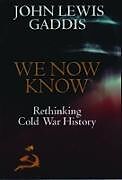We Now Know
Einband:
Kartonierter Einband
EAN:
9780198780717
Untertitel:
Rethinking Cold War History
Genre:
Geschichte
Autor:
John Lewis (Robert Lovett Professor of History, Robert Lovett Professor of History, Yale University) Gaddis
Herausgeber:
Oxford University Press
Anzahl Seiten:
438
Erscheinungsdatum:
12.03.1998
ISBN:
978-0-19-878071-7
Did the Soviet Union want world revolution? Why did the USSR send missiles to Cuba? What made the Cold War last as long as it did? Drawing on new sources and scholarship, John Lewis Gaddis presents a comprehensive comparative history of the conflict from its origins, to its most dangerous moment, the Cuban Missile Crisis. A fresh, thought-provoking and powerfully argued reassessment of the Cold War by one of its most distinguished historians, We Know Now
will set the agenda for debates on this subject for years to come.
Examines the history of the Cold War, reflecting Soviet, East European, Chinese, American, and West European viewpoints, and offering new insights and solutions to long-standing puzzles
'A new narrative of the first half of the Cold War up to the Cuban missile crisis...We Know Now is an important book. It deserves a wide readership.'
Autorentext
John Lewis Gaddis ist einer der renommiertesten Historiker unserer Zeit und gilt als der Doyen der Geschichtsschreibung zum Kalten Krieg. Er ist Professor an der Yale University und veröffentlichte zahlreiche Bücher über den Kalten Krieg, u.a. "We Now Know: Rethinking Cold War History" (1997) und "Surprise, Security, and the American Experience" (2004).
Klappentext
Based on the latest findings of Cold War historians and extensive research in American archives as well as the recently opened archives in Eastern Europe, the former Soviet Union, and China, this book provides a vividly written, eye-opening account of the Cold War during the years from the end of World War II to its most dangerous moment, the Cuban missile crisis.
Zusammenfassung
The end of the Cold War makes it possible, for the first time, to begin writing its history from a truly international perspective, one reflecting Soviet, East European, and Chinese as well as American and West European viewpoints. In a major departure from his earlier scholarship, John Lewis Gaddis, the pre-eminent American authority on the United States and the Cold War, has written a comprehensive comparative history of that conflict from its origins through to its most dangerous moment, the Cuban missile crisis. We Now Know is packed with new information drawn from previously unavailable sources; it also reflects the findings of a new generation of Cold War historians. It contains striking new insights into the role of ideology, democracy, economics, alliances, and nuclear weapons, as well as major reinterpretations of Stalin, Truman, Khrushchev, Mao, Eisenhower, and Kennedy. It suggests solutions to long-standing puzzles: Did the Soviet Union want world revolution? Why was Germany divided? Who started the Korean War? What did the Americans mean by "massive retaliation"? When did the Sino-Soviet split begin? Why did the U.S.S.R. send missiles to Cuba? And what made the Cold War last as long as it did? This is a fresh, thought-provoking and powerfully argued reassessment of the Cold War by one of its most distinguished historians. It will set the agenda for debates on this subject for years to come.
Inhalt
1: Dividing the World
2: Cold War Empires: Europe
3: Cold War Empires: Asia
4: Nuclear Weapons and the Early Cold War
5: The German Question
6: The Third World
7: Economics, Ideology, and Alliance Solidarity
8: Nuclear Weapons and the Escalation of the Cold War
9: The Cuban Missile Crisis
10: The New Cold War History: First Impressions
Notes, Bibliography, Index

Leider konnten wir für diesen Artikel keine Preise ermitteln ...
billigbuch.ch sucht jetzt für Sie die besten Angebote ...
Die aktuellen Verkaufspreise von 6 Onlineshops werden in Realtime abgefragt.
Sie können das gewünschte Produkt anschliessend direkt beim Anbieter Ihrer Wahl bestellen.
Loading...
Die aktuellen Verkaufspreise von 6 Onlineshops werden in Realtime abgefragt.
Sie können das gewünschte Produkt anschliessend direkt beim Anbieter Ihrer Wahl bestellen.
| # | Onlineshop | Preis CHF | Versand CHF | Total CHF | ||
|---|---|---|---|---|---|---|
| 1 | Seller | 0.00 | 0.00 | 0.00 |
